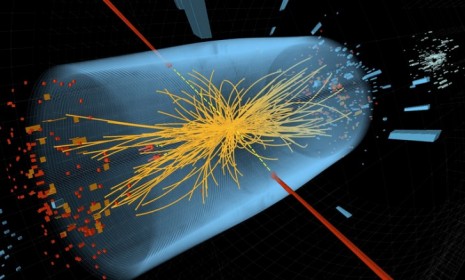What if scientists actually didn't discover the Higgs boson?
American physicists throw cold water on their European colleagues' big "God particle" party. Here's what you need to know

A free daily email with the biggest news stories of the day – and the best features from TheWeek.com
You are now subscribed
Your newsletter sign-up was successful
Maybe Stephen Hawking should ask for his money back. After two teams at Europe's CERN announced on July 4 that they had almost certainly found the elusive Higgs boson, the famous British physicist settled his $100 bet with the University of Michigan's Gordon Kane that the so-called God particle would never be found. But now, Ian Low at Argonne National Laboratory in Illinois and two fellow physicists suggest the possibility that the much-sought-after Higgs boson was not, in fact, the particle the CERN teams discovered. Did the researchers find the actual Higgs, an "impostor" particle, or something else entirely? And why does it matter? Here, a quick guide to this big science showdown:
What exactly is the Higgs again?
The Higgs field is sort of like the invisible glue that holds the universe together, and the Higgs boson is a particle that proves it exists. CERN scientists believe they finally have physical proof of this invisible, universe-wide field, which gave mass to all matter right after the Big Bang, and forced particles to coalesce into stars, planets, and everything else. If the Higgs field, and Higgs boson, didn't exist, the dominant Standard Model of particle physics would be wrong.
The Week
Escape your echo chamber. Get the facts behind the news, plus analysis from multiple perspectives.

Sign up for The Week's Free Newsletters
From our morning news briefing to a weekly Good News Newsletter, get the best of The Week delivered directly to your inbox.
From our morning news briefing to a weekly Good News Newsletter, get the best of The Week delivered directly to your inbox.
And what do the dissenting scientists suggest?
Low, Joseph Lykken, and Gabe Shaughnessy examined the CERN data, gathered from experiments at the Large Hadron Collider, and determined that it could point to at least two other particles just as easily as to the Higgs boson predicted in particle physics' Standard Model of how the universe is put together. In other words, even if "it looks like a Higgs, swims like a Higgs, and quacks like a Higgs," says Ian O'Neill at Discovery News, "in the world of particle physics, it doesn't necessarily mean it is the Higgs."
Was the CERN team wrong?
Not necessarily. The CERN researchers were very careful to note that what they found was a new particle "consistent with the long-sought Higgs boson," and that they needed to do much more work to figure out what exactly they'd discovered. The bottom line is that "there's something new out there, and it could definitely be the Higgs boson," says Evan Ackerman at DVICE, but there's also "a realistic chance that the Higgs (or whatever this is) could turn out to be way, way crazier than we ever thought it would be."
A free daily email with the biggest news stories of the day – and the best features from TheWeek.com
If this isn't the standard Higgs, what is it?
The most likely alternative is a Higgs doppelgänger predicted by more exotic theories of particle physics that posit the Higgs field (which endows all matter with mass) is made up of several different kinds of Higgs-like particles. It could also be some hybrid of standard and more exotic Higgs bosons, Low and Co. say, or the CERN teams could have found evidence of a "warped extra dimension."
Why all the uncertainty?
Identifying subatomic particles isn't easy. "The way that the Large Hadron Collider finds new particles isn't by observing the particles themselves, which (in the case of the Higgs) don't last long enough to be detected directly," says DVICE's Ackerman. Instead, researchers examine all the stuff the particles decay into, like W and Z bosons in the Higgs' case. "Of course, lots of other things decay into that stuff, too, so you have to run experiments over and over again to gain statistical confidence that you're looking at something new." The CERN team did that, but mostly what they found was a new particle in the right mass range for the Higgs boson — or the impostors. Low's point is that "CERN doesn't know a whole lot about what's going on quite yet."
What does all this mean for science, and me?
If the new particle turns out to be the plain-Jane Higgs boson, that will "prove the existence of the Higgs field, and thus the completeness (almost) of the Standard Model of physics," says Lucy Sherriff at ZDNet. If not, physicists "go back to the drawing board and start again." Look, "I hate to be a party pooper," says Bill O'Reilly in Newsday, but who cares? "We of middling intelligence may not understand this God particle, but we've been quietly banking on it for a long time. I can't recall the last time I heard someone blurt out, 'God, I hope this chair has mass!' Or, 'If the Higgs boson doesn't check out, what is this thing I'm driving?'"
Sources: Digital Journal, Discovery News, DVICE, Newsday, Register, Reuters, Technology Review, ZDNet
-
 ‘The West needs people’
‘The West needs people’Instant Opinion Opinion, comment and editorials of the day
-
 Filing statuses: What they are and how to choose one for your taxes
Filing statuses: What they are and how to choose one for your taxesThe Explainer Your status will determine how much you pay, plus the tax credits and deductions you can claim
-
 Nan Goldin: The Ballad of Sexual Dependency – an ‘engrossing’ exhibition
Nan Goldin: The Ballad of Sexual Dependency – an ‘engrossing’ exhibitionThe Week Recommends All 126 images from the American photographer’s ‘influential’ photobook have come to the UK for the first time